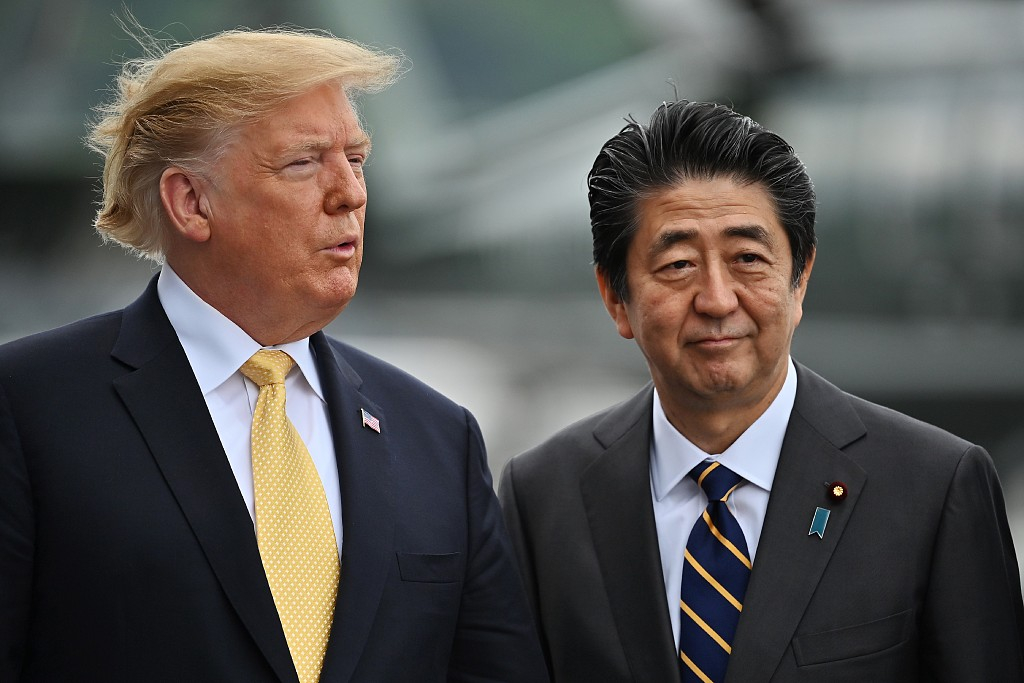
US President Donald Trump (L) stands next to Japan's Prime Minister Shinzo Abe onboard Japan's navy ship Kaga in Yokosuka, Japan, May 28, 2019. (Photo: VCG)
It was a four-day visit filled with pomp and ceremony, a round of golf and even some sumo wrestling. But, behind the warm and friendly relationship between Prime Minister Shinzo Abe and President Donald Trump lay tensions over such issues as trade, the Democratic People's Republic of Korea (DPRK) and Iran.
Shihoko Goto, a senior Northeast Asia associate at the Wilson Center, thinks the visit demonstrates the unity between the US and Japan in a world fraught with tension. On the diplomatic front, the visit sent a signal of close bilateral ties, but on the policy front, there hasn't been any breakthrough.
Goto said President Trump's tariff threat is a tremendous risk for Japan, as Abe wants to make sure that the Japanese car industry is sheltered from levies.
She argues that the Japanese side is frustrated, noting that she has seen slight changes in the rhetoric from Japanese companies. Japan is the third largest provider of Foreign Directly Investment (FDI) in the US and Japanese firms are beginning to consider whether they should continually invest in the United States.
The risks are increasing, but the American market is incredibly important to them.
"Japan is paying the price for the US withdrawing from the TPP," Goto said, "the US is losing market share in Japan. Japan also signed the Earth Free Trade Agreement with the EU, and it's got cheaper food from the European countries."
Some US media described the visit as an attempt by Trump to get on better terms with Japan as a counterbalance to China. Einar Tangen, a political and economic affairs commentator based in Beijing, believes that if this is the case, then Trump has failed. "He (Trump) was physically in Japan, but he was somehow stuck in the ‘Twitterverse,'" he says. Trump spent a lot of time on US domestic issues while in Japan.
Tangen pointed out that imposing tariffs will hurt the US in the long term. "If you start pushing these (Japanese) companies away, it's very hard to bring them back," Tangen argued. In addition, since Trump took office, the arms sales have gone through the roof. Tangen suggested President Trump has a predictable pattern – wherever he goes, he announces some sort of arms sales.
"But I don't think he can achieve peace through weapons.”
Tangen emphasized that the trip was about two issues: meeting the new Japanese emperor and trade and security issues. “On both fronts, there was a complete failure and miscommunication.”
John Sitilides, a geopolitical strategist and consultant to the US State Department, pointed out that President Trump probably could use more discipline when it comes to tweeting, but a large amount of substantive policy achievement has been accomplished there. From Abe's position, there is a robust implementation of a program for a free Indo-Pacific Region.
"We can also see preparations for what will be a key meeting between Prime Minister Abe and Chinese President Xi Jinping in the weeks ahead," Sitilides says.
In the expert's view, the trade negotiations are also a big risk for the United States. From trade, commercial and military perspectives, it's enormously important for the US and its Pacific allies to maintain the US-Japan relationship, especially with a deal of 100 F-35 fighter jets. He thinks the Japanese people are looking to increase their different capabilities and provide President Trump with a major military sale announcement back home.
In terms of the trade ties, Trump wants to increase the volume of imports from Japan but at the same time, he is threatening Japan with trade tariffs on its auto parts exports. Sitilides indicates that Trump refuses to fit into a presidential box as Americans expected, "he'll do things the way he has done successfully for decades as a businessman and it's very difficult for political leaders, especially our allies, to understand him and put him in a box."
Yoshikazu Kato, an adjunct associate professor at the University of Hong Kong's Asia Global Institute and a research fellow at the Charhar Institute, indicates that Abe is trying to implement more comprehensive policies to combine the economic operations with strategic and security operations and he needs some help from President Trump.
Japan is going to hold the G20 Summit in Osaka soon, and Abe also has to solve the nuclear issues between Seoul and Pyongyang. Kato thinks this is a very critical point and that it's time for Abe to tackle these issues, so he emphasized the US-Japan alliance and friendship to get some help from Washington.
Kato also agreed with the point that America is losing its market in Japan. He believes Abe needs to substantially focus and raise some questions in order to exercise the leadership beyond the US-Japan alliance.
With regard to the Iranian issue, Goto thinks the Iranian Foreign Minister went to Japan a few days ago in the hope that the Japanese leadership will be able to articulate some of Tehran's concerns. Iranians expect Japan to play a more mediatory role in the US-Iran tensions. Abe himself also wants to take that role.
Kato echoed this view, saying that "Abe is trying to make a bridge between the two countries and expand Japan's influence in the Middle East.”


